A Comparative Analysis of Person-Centered and Gestalt Therapy - COU101
VerifiedAdded on 2022/10/19
|8
|1887
|10
Report
AI Summary
This report provides a comparative analysis of two prominent counselling theories: person-centered therapy and Gestalt therapy. It begins by highlighting the commonalities between the two approaches, such as their limited focal points, tendency to focus on the status quo of clients, and reliance on therapist rigidity. The report then contrasts the theories, differentiating between the founders (Carl Rogers for person-centered and Laura Perls and Paul Goodman for Gestalt), their core focuses (the individual versus the individual within their experience and context), and their applications and evidence bases. The report outlines the core tenets of each theory, including self-actualization in person-centered therapy and awareness and holistic perception in Gestalt therapy. It also discusses the therapeutic techniques and goals of each approach. The report concludes by emphasizing the significance of both theories in the field of counselling and their contributions to understanding and addressing psychological challenges, with references to the provided literature.
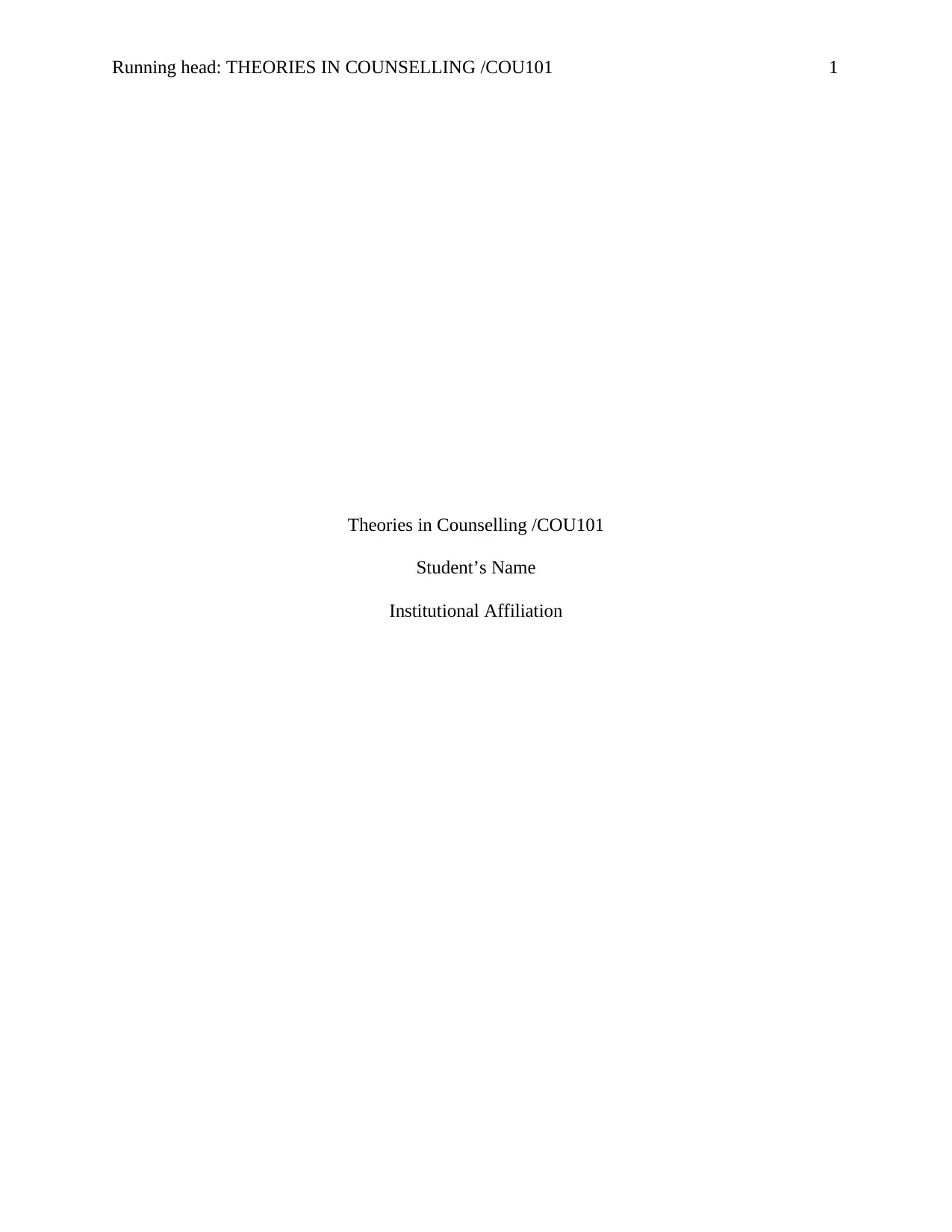
Running head: THEORIES IN COUNSELLING /COU101 1
Theories in Counselling /COU101
Student’s Name
Institutional Affiliation
Theories in Counselling /COU101
Student’s Name
Institutional Affiliation
Paraphrase This Document
Need a fresh take? Get an instant paraphrase of this document with our AI Paraphraser
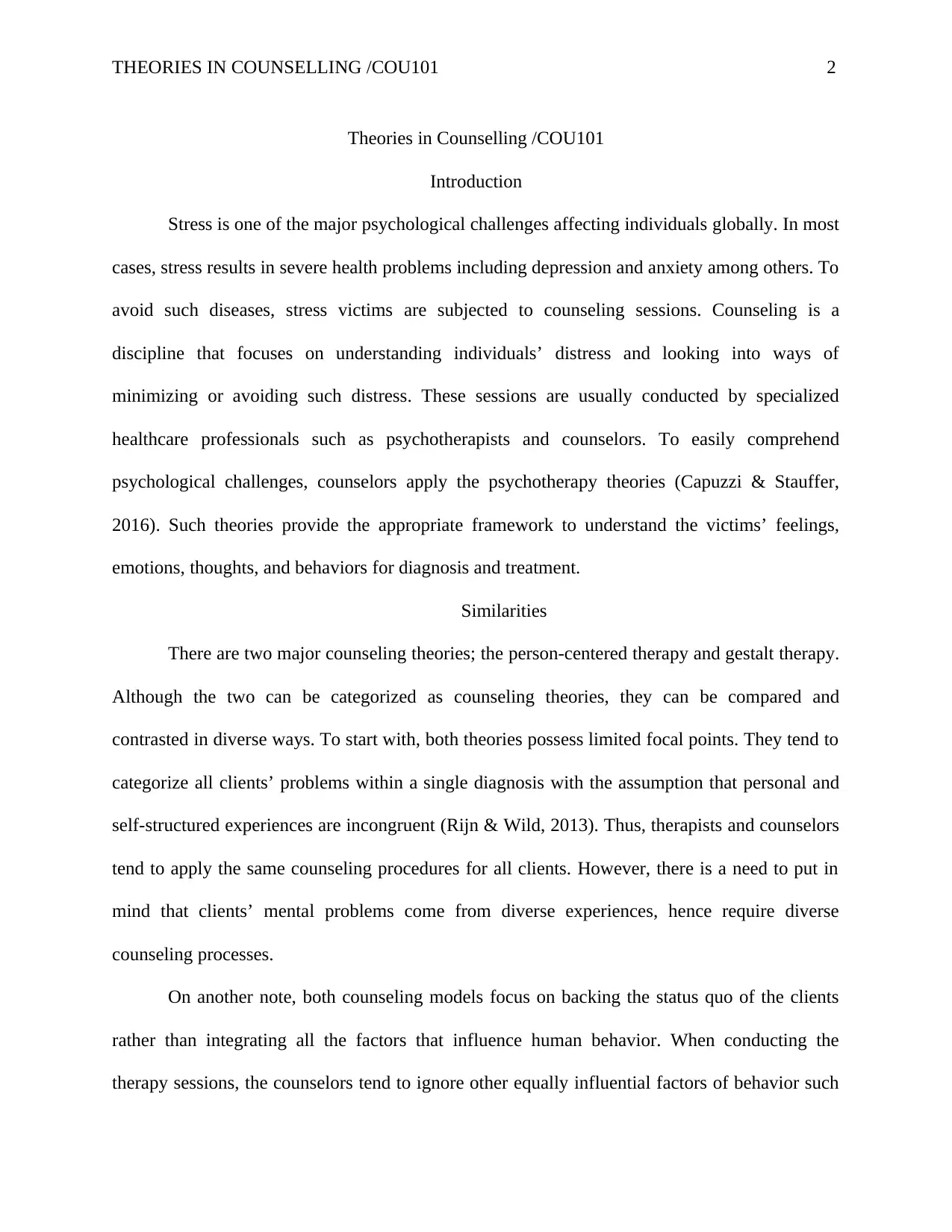
THEORIES IN COUNSELLING /COU101 2
Theories in Counselling /COU101
Introduction
Stress is one of the major psychological challenges affecting individuals globally. In most
cases, stress results in severe health problems including depression and anxiety among others. To
avoid such diseases, stress victims are subjected to counseling sessions. Counseling is a
discipline that focuses on understanding individuals’ distress and looking into ways of
minimizing or avoiding such distress. These sessions are usually conducted by specialized
healthcare professionals such as psychotherapists and counselors. To easily comprehend
psychological challenges, counselors apply the psychotherapy theories (Capuzzi & Stauffer,
2016). Such theories provide the appropriate framework to understand the victims’ feelings,
emotions, thoughts, and behaviors for diagnosis and treatment.
Similarities
There are two major counseling theories; the person-centered therapy and gestalt therapy.
Although the two can be categorized as counseling theories, they can be compared and
contrasted in diverse ways. To start with, both theories possess limited focal points. They tend to
categorize all clients’ problems within a single diagnosis with the assumption that personal and
self-structured experiences are incongruent (Rijn & Wild, 2013). Thus, therapists and counselors
tend to apply the same counseling procedures for all clients. However, there is a need to put in
mind that clients’ mental problems come from diverse experiences, hence require diverse
counseling processes.
On another note, both counseling models focus on backing the status quo of the clients
rather than integrating all the factors that influence human behavior. When conducting the
therapy sessions, the counselors tend to ignore other equally influential factors of behavior such
Theories in Counselling /COU101
Introduction
Stress is one of the major psychological challenges affecting individuals globally. In most
cases, stress results in severe health problems including depression and anxiety among others. To
avoid such diseases, stress victims are subjected to counseling sessions. Counseling is a
discipline that focuses on understanding individuals’ distress and looking into ways of
minimizing or avoiding such distress. These sessions are usually conducted by specialized
healthcare professionals such as psychotherapists and counselors. To easily comprehend
psychological challenges, counselors apply the psychotherapy theories (Capuzzi & Stauffer,
2016). Such theories provide the appropriate framework to understand the victims’ feelings,
emotions, thoughts, and behaviors for diagnosis and treatment.
Similarities
There are two major counseling theories; the person-centered therapy and gestalt therapy.
Although the two can be categorized as counseling theories, they can be compared and
contrasted in diverse ways. To start with, both theories possess limited focal points. They tend to
categorize all clients’ problems within a single diagnosis with the assumption that personal and
self-structured experiences are incongruent (Rijn & Wild, 2013). Thus, therapists and counselors
tend to apply the same counseling procedures for all clients. However, there is a need to put in
mind that clients’ mental problems come from diverse experiences, hence require diverse
counseling processes.
On another note, both counseling models focus on backing the status quo of the clients
rather than integrating all the factors that influence human behavior. When conducting the
therapy sessions, the counselors tend to ignore other equally influential factors of behavior such
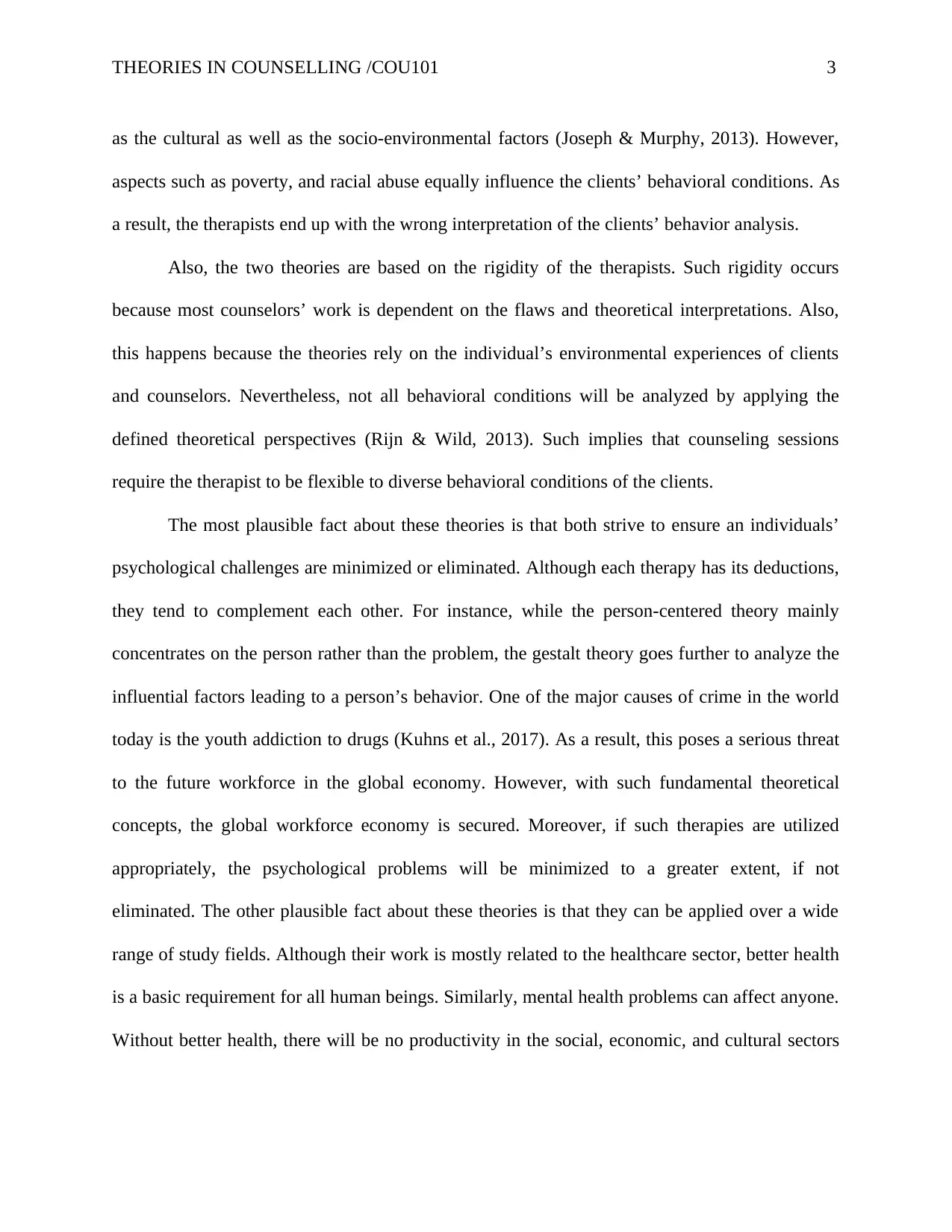
THEORIES IN COUNSELLING /COU101 3
as the cultural as well as the socio-environmental factors (Joseph & Murphy, 2013). However,
aspects such as poverty, and racial abuse equally influence the clients’ behavioral conditions. As
a result, the therapists end up with the wrong interpretation of the clients’ behavior analysis.
Also, the two theories are based on the rigidity of the therapists. Such rigidity occurs
because most counselors’ work is dependent on the flaws and theoretical interpretations. Also,
this happens because the theories rely on the individual’s environmental experiences of clients
and counselors. Nevertheless, not all behavioral conditions will be analyzed by applying the
defined theoretical perspectives (Rijn & Wild, 2013). Such implies that counseling sessions
require the therapist to be flexible to diverse behavioral conditions of the clients.
The most plausible fact about these theories is that both strive to ensure an individuals’
psychological challenges are minimized or eliminated. Although each therapy has its deductions,
they tend to complement each other. For instance, while the person-centered theory mainly
concentrates on the person rather than the problem, the gestalt theory goes further to analyze the
influential factors leading to a person’s behavior. One of the major causes of crime in the world
today is the youth addiction to drugs (Kuhns et al., 2017). As a result, this poses a serious threat
to the future workforce in the global economy. However, with such fundamental theoretical
concepts, the global workforce economy is secured. Moreover, if such therapies are utilized
appropriately, the psychological problems will be minimized to a greater extent, if not
eliminated. The other plausible fact about these theories is that they can be applied over a wide
range of study fields. Although their work is mostly related to the healthcare sector, better health
is a basic requirement for all human beings. Similarly, mental health problems can affect anyone.
Without better health, there will be no productivity in the social, economic, and cultural sectors
as the cultural as well as the socio-environmental factors (Joseph & Murphy, 2013). However,
aspects such as poverty, and racial abuse equally influence the clients’ behavioral conditions. As
a result, the therapists end up with the wrong interpretation of the clients’ behavior analysis.
Also, the two theories are based on the rigidity of the therapists. Such rigidity occurs
because most counselors’ work is dependent on the flaws and theoretical interpretations. Also,
this happens because the theories rely on the individual’s environmental experiences of clients
and counselors. Nevertheless, not all behavioral conditions will be analyzed by applying the
defined theoretical perspectives (Rijn & Wild, 2013). Such implies that counseling sessions
require the therapist to be flexible to diverse behavioral conditions of the clients.
The most plausible fact about these theories is that both strive to ensure an individuals’
psychological challenges are minimized or eliminated. Although each therapy has its deductions,
they tend to complement each other. For instance, while the person-centered theory mainly
concentrates on the person rather than the problem, the gestalt theory goes further to analyze the
influential factors leading to a person’s behavior. One of the major causes of crime in the world
today is the youth addiction to drugs (Kuhns et al., 2017). As a result, this poses a serious threat
to the future workforce in the global economy. However, with such fundamental theoretical
concepts, the global workforce economy is secured. Moreover, if such therapies are utilized
appropriately, the psychological problems will be minimized to a greater extent, if not
eliminated. The other plausible fact about these theories is that they can be applied over a wide
range of study fields. Although their work is mostly related to the healthcare sector, better health
is a basic requirement for all human beings. Similarly, mental health problems can affect anyone.
Without better health, there will be no productivity in the social, economic, and cultural sectors
⊘ This is a preview!⊘
Do you want full access?
Subscribe today to unlock all pages.

Trusted by 1+ million students worldwide
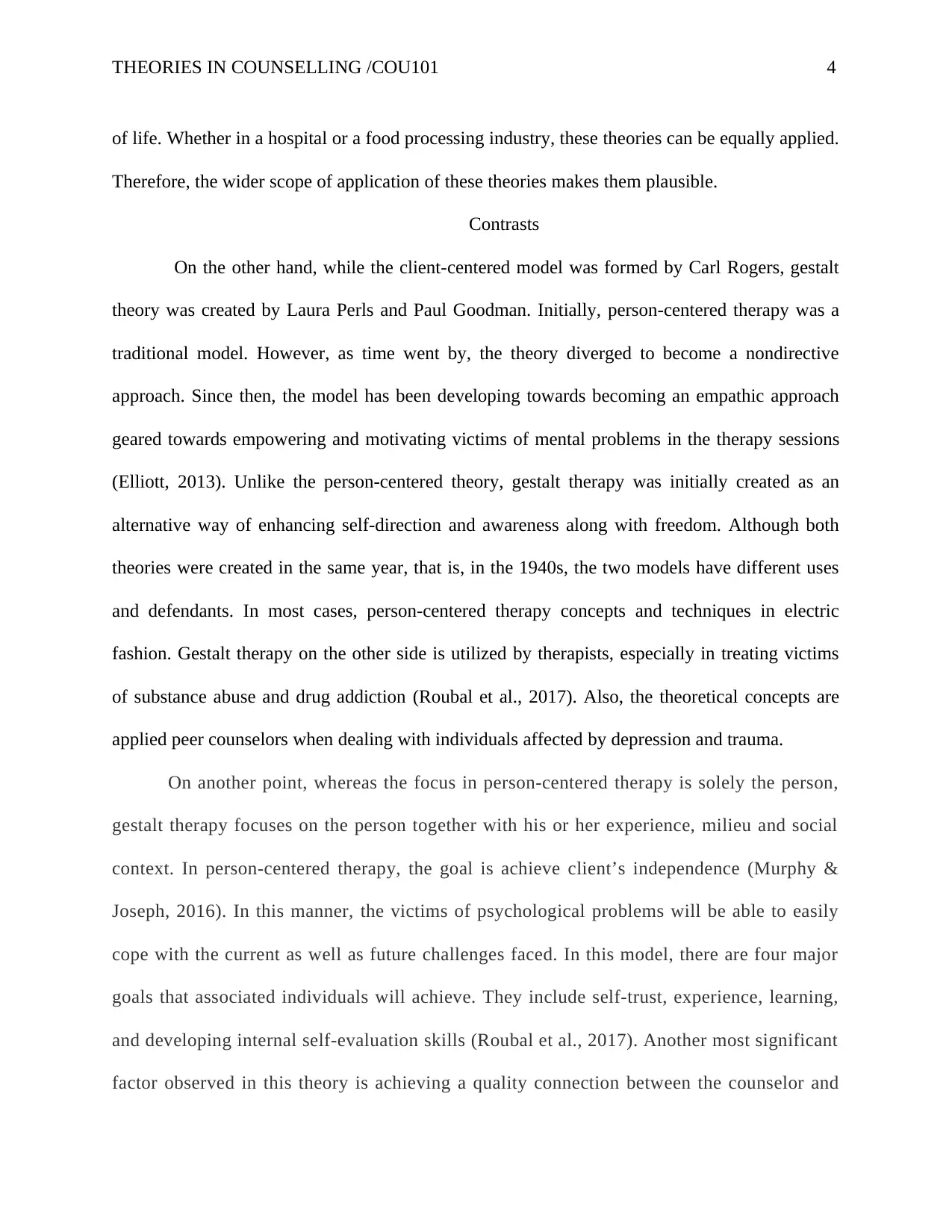
THEORIES IN COUNSELLING /COU101 4
of life. Whether in a hospital or a food processing industry, these theories can be equally applied.
Therefore, the wider scope of application of these theories makes them plausible.
Contrasts
On the other hand, while the client-centered model was formed by Carl Rogers, gestalt
theory was created by Laura Perls and Paul Goodman. Initially, person-centered therapy was a
traditional model. However, as time went by, the theory diverged to become a nondirective
approach. Since then, the model has been developing towards becoming an empathic approach
geared towards empowering and motivating victims of mental problems in the therapy sessions
(Elliott, 2013). Unlike the person-centered theory, gestalt therapy was initially created as an
alternative way of enhancing self-direction and awareness along with freedom. Although both
theories were created in the same year, that is, in the 1940s, the two models have different uses
and defendants. In most cases, person-centered therapy concepts and techniques in electric
fashion. Gestalt therapy on the other side is utilized by therapists, especially in treating victims
of substance abuse and drug addiction (Roubal et al., 2017). Also, the theoretical concepts are
applied peer counselors when dealing with individuals affected by depression and trauma.
On another point, whereas the focus in person-centered therapy is solely the person,
gestalt therapy focuses on the person together with his or her experience, milieu and social
context. In person-centered therapy, the goal is achieve client’s independence (Murphy &
Joseph, 2016). In this manner, the victims of psychological problems will be able to easily
cope with the current as well as future challenges faced. In this model, there are four major
goals that associated individuals will achieve. They include self-trust, experience, learning,
and developing internal self-evaluation skills (Roubal et al., 2017). Another most significant
factor observed in this theory is achieving a quality connection between the counselor and
of life. Whether in a hospital or a food processing industry, these theories can be equally applied.
Therefore, the wider scope of application of these theories makes them plausible.
Contrasts
On the other hand, while the client-centered model was formed by Carl Rogers, gestalt
theory was created by Laura Perls and Paul Goodman. Initially, person-centered therapy was a
traditional model. However, as time went by, the theory diverged to become a nondirective
approach. Since then, the model has been developing towards becoming an empathic approach
geared towards empowering and motivating victims of mental problems in the therapy sessions
(Elliott, 2013). Unlike the person-centered theory, gestalt therapy was initially created as an
alternative way of enhancing self-direction and awareness along with freedom. Although both
theories were created in the same year, that is, in the 1940s, the two models have different uses
and defendants. In most cases, person-centered therapy concepts and techniques in electric
fashion. Gestalt therapy on the other side is utilized by therapists, especially in treating victims
of substance abuse and drug addiction (Roubal et al., 2017). Also, the theoretical concepts are
applied peer counselors when dealing with individuals affected by depression and trauma.
On another point, whereas the focus in person-centered therapy is solely the person,
gestalt therapy focuses on the person together with his or her experience, milieu and social
context. In person-centered therapy, the goal is achieve client’s independence (Murphy &
Joseph, 2016). In this manner, the victims of psychological problems will be able to easily
cope with the current as well as future challenges faced. In this model, there are four major
goals that associated individuals will achieve. They include self-trust, experience, learning,
and developing internal self-evaluation skills (Roubal et al., 2017). Another most significant
factor observed in this theory is achieving a quality connection between the counselor and
Paraphrase This Document
Need a fresh take? Get an instant paraphrase of this document with our AI Paraphraser
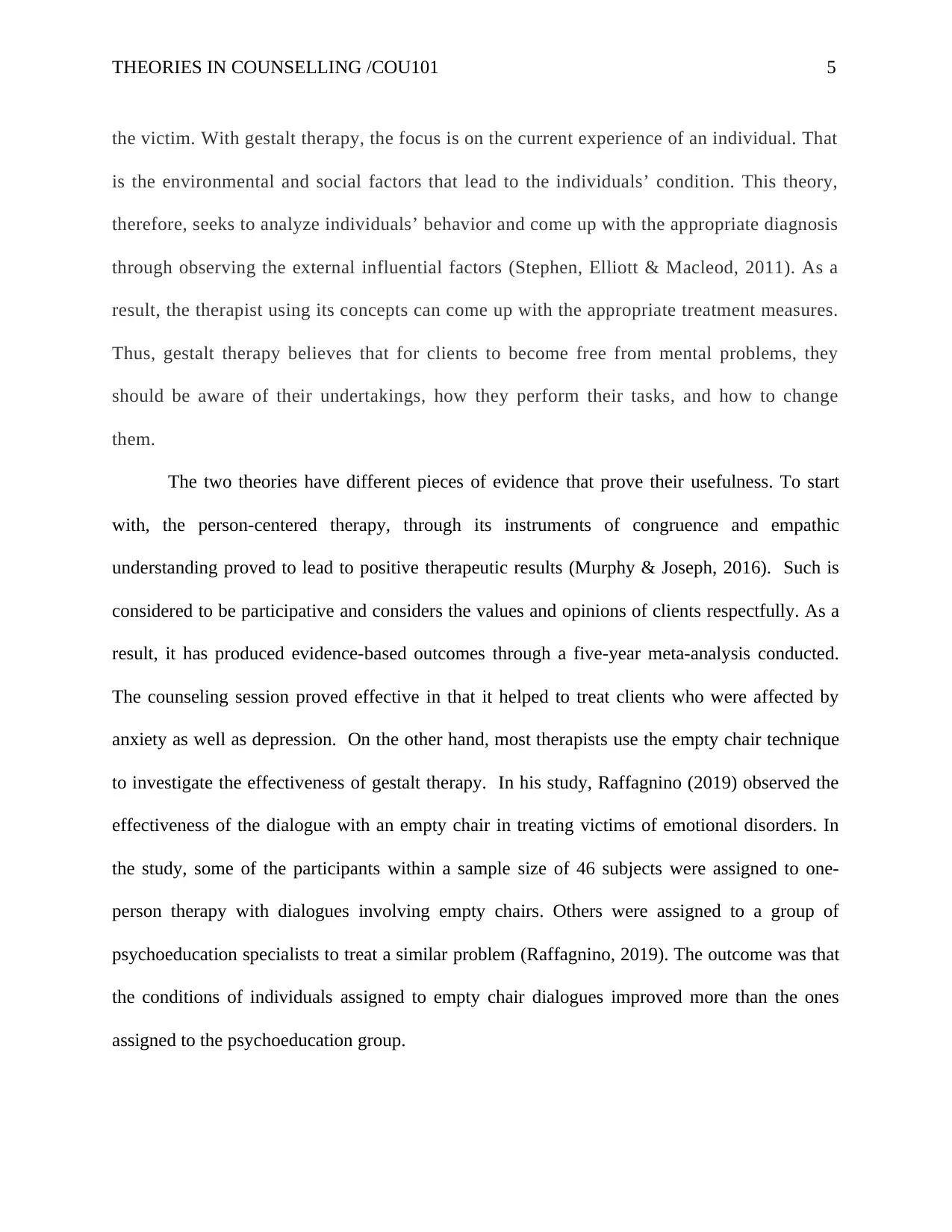
THEORIES IN COUNSELLING /COU101 5
the victim. With gestalt therapy, the focus is on the current experience of an individual. That
is the environmental and social factors that lead to the individuals’ condition. This theory,
therefore, seeks to analyze individuals’ behavior and come up with the appropriate diagnosis
through observing the external influential factors (Stephen, Elliott & Macleod, 2011). As a
result, the therapist using its concepts can come up with the appropriate treatment measures.
Thus, gestalt therapy believes that for clients to become free from mental problems, they
should be aware of their undertakings, how they perform their tasks, and how to change
them.
The two theories have different pieces of evidence that prove their usefulness. To start
with, the person-centered therapy, through its instruments of congruence and empathic
understanding proved to lead to positive therapeutic results (Murphy & Joseph, 2016). Such is
considered to be participative and considers the values and opinions of clients respectfully. As a
result, it has produced evidence-based outcomes through a five-year meta-analysis conducted.
The counseling session proved effective in that it helped to treat clients who were affected by
anxiety as well as depression. On the other hand, most therapists use the empty chair technique
to investigate the effectiveness of gestalt therapy. In his study, Raffagnino (2019) observed the
effectiveness of the dialogue with an empty chair in treating victims of emotional disorders. In
the study, some of the participants within a sample size of 46 subjects were assigned to one-
person therapy with dialogues involving empty chairs. Others were assigned to a group of
psychoeducation specialists to treat a similar problem (Raffagnino, 2019). The outcome was that
the conditions of individuals assigned to empty chair dialogues improved more than the ones
assigned to the psychoeducation group.
the victim. With gestalt therapy, the focus is on the current experience of an individual. That
is the environmental and social factors that lead to the individuals’ condition. This theory,
therefore, seeks to analyze individuals’ behavior and come up with the appropriate diagnosis
through observing the external influential factors (Stephen, Elliott & Macleod, 2011). As a
result, the therapist using its concepts can come up with the appropriate treatment measures.
Thus, gestalt therapy believes that for clients to become free from mental problems, they
should be aware of their undertakings, how they perform their tasks, and how to change
them.
The two theories have different pieces of evidence that prove their usefulness. To start
with, the person-centered therapy, through its instruments of congruence and empathic
understanding proved to lead to positive therapeutic results (Murphy & Joseph, 2016). Such is
considered to be participative and considers the values and opinions of clients respectfully. As a
result, it has produced evidence-based outcomes through a five-year meta-analysis conducted.
The counseling session proved effective in that it helped to treat clients who were affected by
anxiety as well as depression. On the other hand, most therapists use the empty chair technique
to investigate the effectiveness of gestalt therapy. In his study, Raffagnino (2019) observed the
effectiveness of the dialogue with an empty chair in treating victims of emotional disorders. In
the study, some of the participants within a sample size of 46 subjects were assigned to one-
person therapy with dialogues involving empty chairs. Others were assigned to a group of
psychoeducation specialists to treat a similar problem (Raffagnino, 2019). The outcome was that
the conditions of individuals assigned to empty chair dialogues improved more than the ones
assigned to the psychoeducation group.
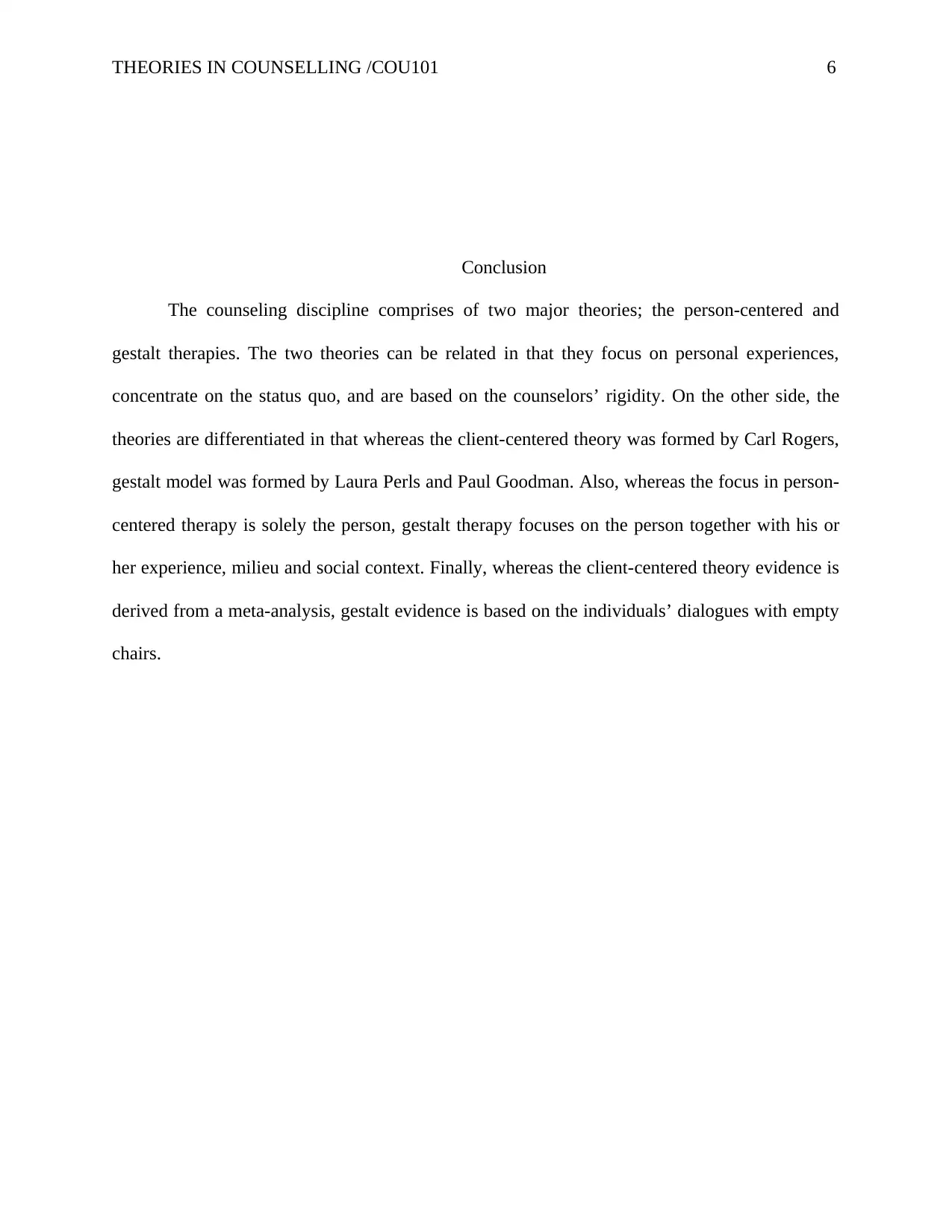
THEORIES IN COUNSELLING /COU101 6
Conclusion
The counseling discipline comprises of two major theories; the person-centered and
gestalt therapies. The two theories can be related in that they focus on personal experiences,
concentrate on the status quo, and are based on the counselors’ rigidity. On the other side, the
theories are differentiated in that whereas the client-centered theory was formed by Carl Rogers,
gestalt model was formed by Laura Perls and Paul Goodman. Also, whereas the focus in person-
centered therapy is solely the person, gestalt therapy focuses on the person together with his or
her experience, milieu and social context. Finally, whereas the client-centered theory evidence is
derived from a meta-analysis, gestalt evidence is based on the individuals’ dialogues with empty
chairs.
Conclusion
The counseling discipline comprises of two major theories; the person-centered and
gestalt therapies. The two theories can be related in that they focus on personal experiences,
concentrate on the status quo, and are based on the counselors’ rigidity. On the other side, the
theories are differentiated in that whereas the client-centered theory was formed by Carl Rogers,
gestalt model was formed by Laura Perls and Paul Goodman. Also, whereas the focus in person-
centered therapy is solely the person, gestalt therapy focuses on the person together with his or
her experience, milieu and social context. Finally, whereas the client-centered theory evidence is
derived from a meta-analysis, gestalt evidence is based on the individuals’ dialogues with empty
chairs.
⊘ This is a preview!⊘
Do you want full access?
Subscribe today to unlock all pages.

Trusted by 1+ million students worldwide
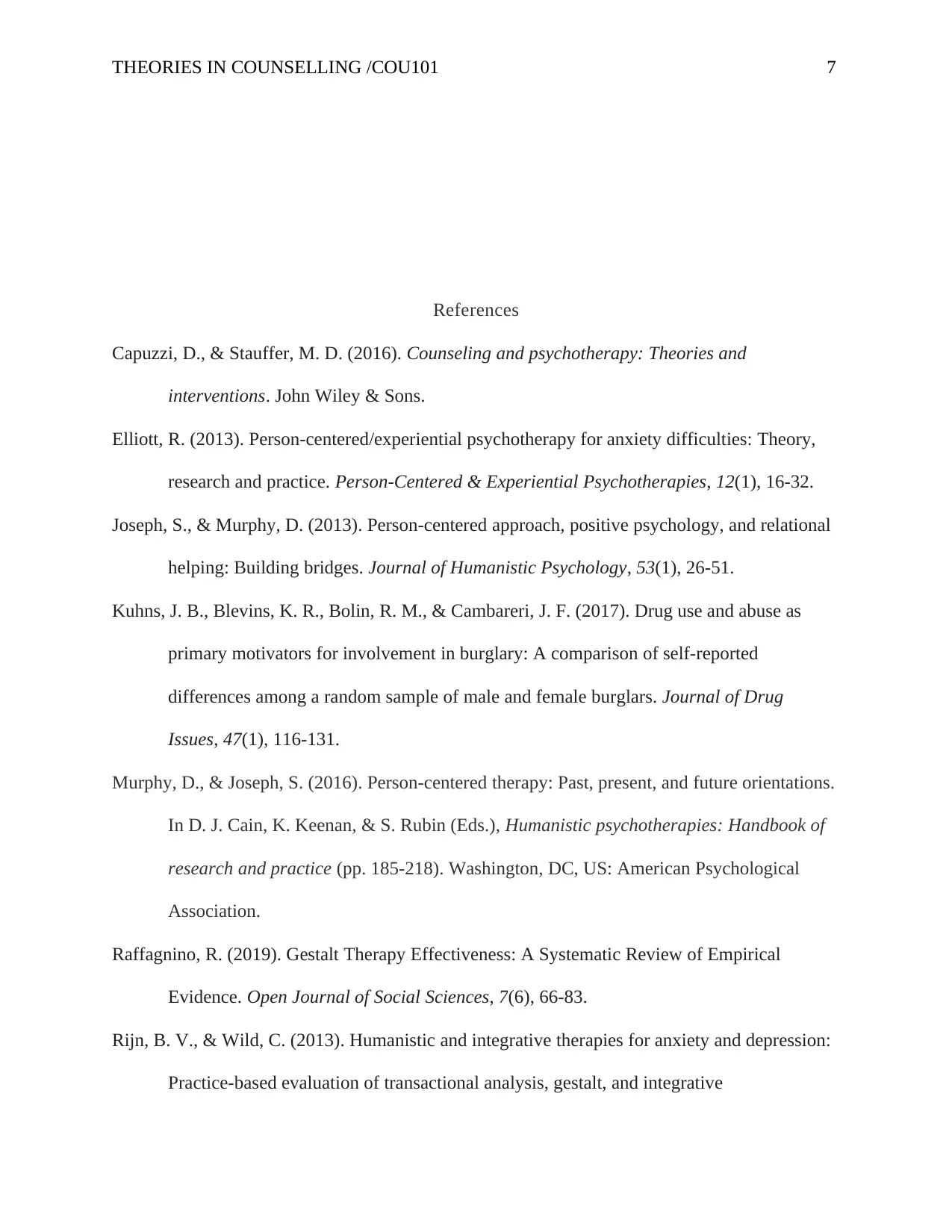
THEORIES IN COUNSELLING /COU101 7
References
Capuzzi, D., & Stauffer, M. D. (2016). Counseling and psychotherapy: Theories and
interventions. John Wiley & Sons.
Elliott, R. (2013). Person-centered/experiential psychotherapy for anxiety difficulties: Theory,
research and practice. Person-Centered & Experiential Psychotherapies, 12(1), 16-32.
Joseph, S., & Murphy, D. (2013). Person-centered approach, positive psychology, and relational
helping: Building bridges. Journal of Humanistic Psychology, 53(1), 26-51.
Kuhns, J. B., Blevins, K. R., Bolin, R. M., & Cambareri, J. F. (2017). Drug use and abuse as
primary motivators for involvement in burglary: A comparison of self-reported
differences among a random sample of male and female burglars. Journal of Drug
Issues, 47(1), 116-131.
Murphy, D., & Joseph, S. (2016). Person-centered therapy: Past, present, and future orientations.
In D. J. Cain, K. Keenan, & S. Rubin (Eds.), Humanistic psychotherapies: Handbook of
research and practice (pp. 185-218). Washington, DC, US: American Psychological
Association.
Raffagnino, R. (2019). Gestalt Therapy Effectiveness: A Systematic Review of Empirical
Evidence. Open Journal of Social Sciences, 7(6), 66-83.
Rijn, B. V., & Wild, C. (2013). Humanistic and integrative therapies for anxiety and depression:
Practice-based evaluation of transactional analysis, gestalt, and integrative
References
Capuzzi, D., & Stauffer, M. D. (2016). Counseling and psychotherapy: Theories and
interventions. John Wiley & Sons.
Elliott, R. (2013). Person-centered/experiential psychotherapy for anxiety difficulties: Theory,
research and practice. Person-Centered & Experiential Psychotherapies, 12(1), 16-32.
Joseph, S., & Murphy, D. (2013). Person-centered approach, positive psychology, and relational
helping: Building bridges. Journal of Humanistic Psychology, 53(1), 26-51.
Kuhns, J. B., Blevins, K. R., Bolin, R. M., & Cambareri, J. F. (2017). Drug use and abuse as
primary motivators for involvement in burglary: A comparison of self-reported
differences among a random sample of male and female burglars. Journal of Drug
Issues, 47(1), 116-131.
Murphy, D., & Joseph, S. (2016). Person-centered therapy: Past, present, and future orientations.
In D. J. Cain, K. Keenan, & S. Rubin (Eds.), Humanistic psychotherapies: Handbook of
research and practice (pp. 185-218). Washington, DC, US: American Psychological
Association.
Raffagnino, R. (2019). Gestalt Therapy Effectiveness: A Systematic Review of Empirical
Evidence. Open Journal of Social Sciences, 7(6), 66-83.
Rijn, B. V., & Wild, C. (2013). Humanistic and integrative therapies for anxiety and depression:
Practice-based evaluation of transactional analysis, gestalt, and integrative
Paraphrase This Document
Need a fresh take? Get an instant paraphrase of this document with our AI Paraphraser
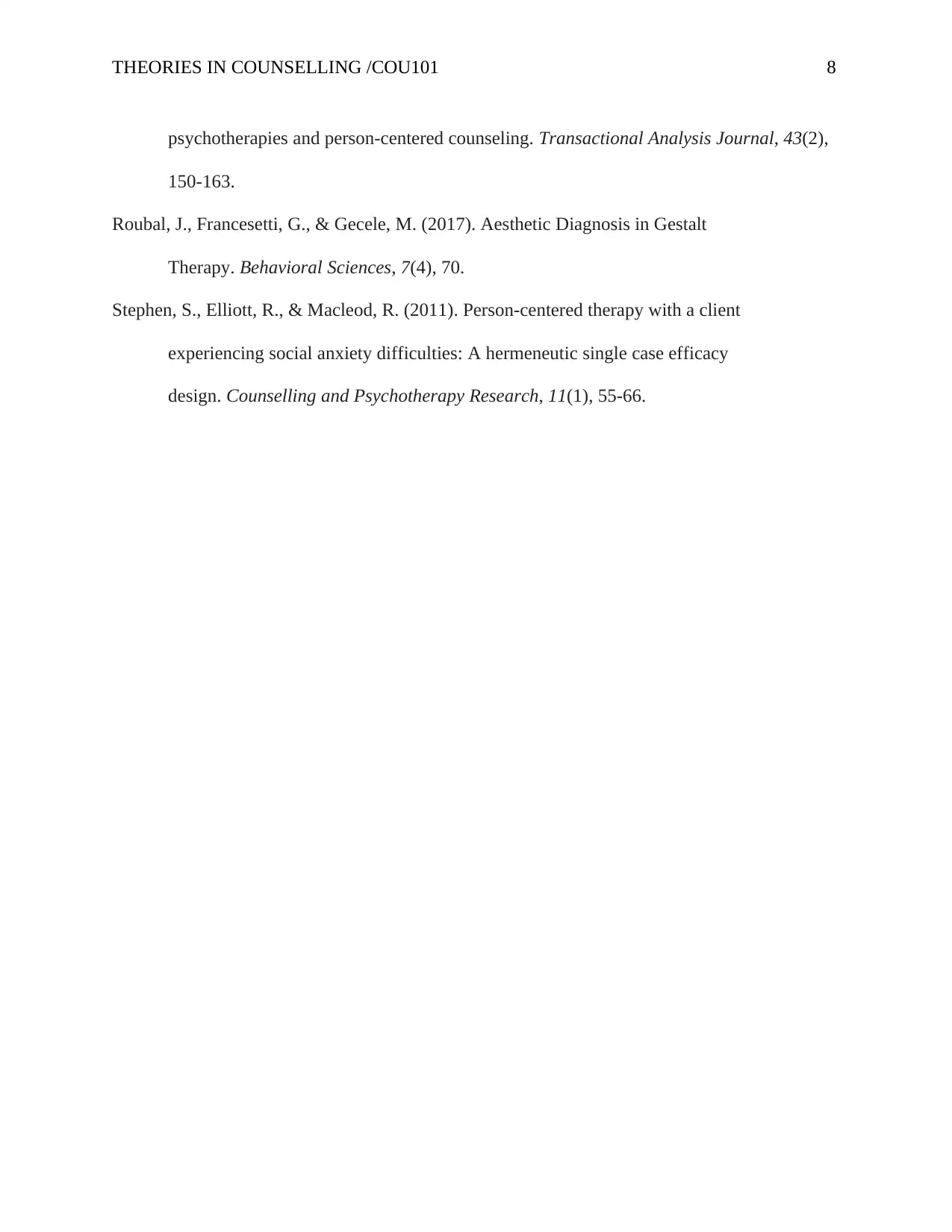
THEORIES IN COUNSELLING /COU101 8
psychotherapies and person-centered counseling. Transactional Analysis Journal, 43(2),
150-163.
Roubal, J., Francesetti, G., & Gecele, M. (2017). Aesthetic Diagnosis in Gestalt
Therapy. Behavioral Sciences, 7(4), 70.
Stephen, S., Elliott, R., & Macleod, R. (2011). Person-centered therapy with a client
experiencing social anxiety difficulties: A hermeneutic single case efficacy
design. Counselling and Psychotherapy Research, 11(1), 55-66.
psychotherapies and person-centered counseling. Transactional Analysis Journal, 43(2),
150-163.
Roubal, J., Francesetti, G., & Gecele, M. (2017). Aesthetic Diagnosis in Gestalt
Therapy. Behavioral Sciences, 7(4), 70.
Stephen, S., Elliott, R., & Macleod, R. (2011). Person-centered therapy with a client
experiencing social anxiety difficulties: A hermeneutic single case efficacy
design. Counselling and Psychotherapy Research, 11(1), 55-66.
1 out of 8
Related Documents
Your All-in-One AI-Powered Toolkit for Academic Success.
+13062052269
info@desklib.com
Available 24*7 on WhatsApp / Email
![[object Object]](/_next/static/media/star-bottom.7253800d.svg)
Unlock your academic potential
Copyright © 2020–2026 A2Z Services. All Rights Reserved. Developed and managed by ZUCOL.



